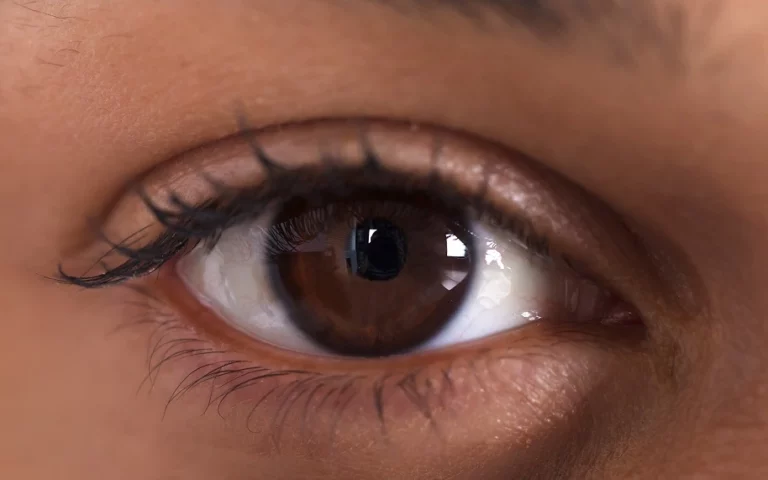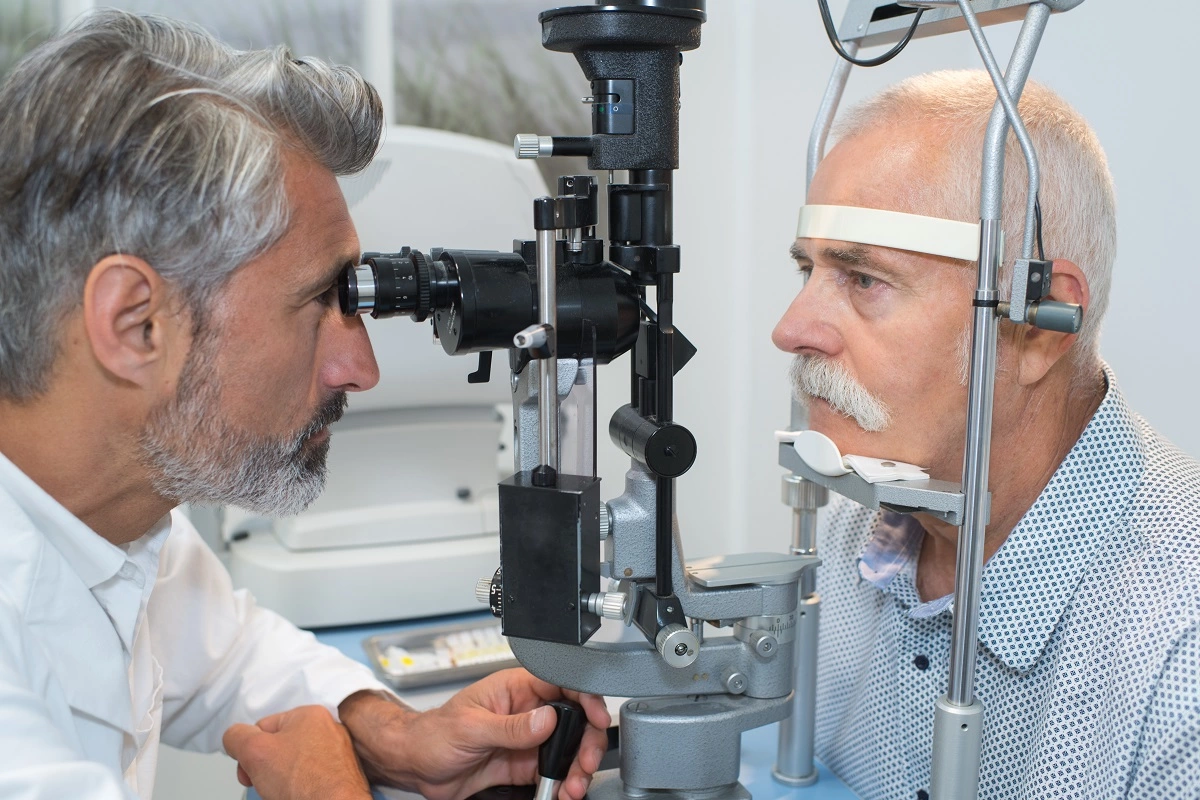Vision problems and brain tumours
Brain tumours can sometimes cause vision problems. This can be because of the tumour itself or its treatments. And, around 1 in 3 people affected by a brain tumour report a problem with their vision.

Short summary
Vision problems are among the signs and symptoms of brain tumours. They might be caused by the tumour itself affecting the part of the brain that is responsible for vision. Or, they may be caused by the type of treatment being given.
Some possible vision problems that you might experience are partial or full loss of vision, dry eyes, double vision, light sensitivity, and more.
But, it’s important to remember that not everybody who is affected by a brain tumour will experience sight difficulties or visual impairment.
Also, symptoms can be different from person to person. So, you might not have any vision problems. And, if you do, they could be very different from someone with a similar diagnosis and treatment plan.
On this page, we’ll discuss:
- What vision problems could I experience?
- What causes vision problems?
- Coping with vision problems
- Frequently asked questions
Other symptoms
Use our Better Safe Than Tumour symptom checker to check for other brain tumour symptoms.
Eye tests and brain tumours
Brain tumour can sometimes be detected through eye tests.
Expert benefits & money advice
Benefits and Money Advice Clinic supported 339 people in the last financial year (22/23), to the tune of £807,938.
What vision problems could I experience?
-
The visual field is the total area you can see while looking at one point. There are many different types of field loss. If the outer part of your visual field is damaged, it’s called peripheral field loss.
Other types of field loss can be more obvious. You may have a quarter of your visual field affected (which is called a quadrantanopia) or half of your field affected (which is called a hemianopia). If you’ve lost half your field of vision on the same side in both eyes, it’s called a homonymous hemianopia.
Everyday tasks, such as reading, watching television and travelling safely outdoors in new areas, can become difficult. You may often feel surprised by items or people suddenly appearing or be unaware of the field defect and unconsciously neglect the missing area of vision. This can lead to bumping into things on one side, eating half a plate of food only, or only reading half a line of print.
-
Double vision (also known as diplopia) is when you see two images of a single object. The images may be side by side, one on top of the other, or diagonal to each other. It may happen all the time, or only in certain circumstances.
Double vision may be very obvious, or may appear as blurred vision. Young children may not be able to say that they have double vision. Instead, they may cover one eye, screw their eyes up, turn their head sideways or tilt it instead of looking straight. You may also notice one eye turning in or out which could cause double vision.
-
Your vision may become sensitive to light due to the treatment for your tumour, this is also known as photophobia. This could be short term or long term.
Light sensitivity is when your brain struggles to adjust to different levels of light. You may need to allow extra time for your eyes to adjust when moving between areas of different levels of light. This may be very uncomfortable.
-
Some large tumours can cause facial palsy. This can lead to dry eyes or watery eyes, difficulty closing your eyes, redness, and blurring of vision.
If you cannot close your eyes, the tears in your eyes can’t be spread over the eye and the surface of the eye can be exposed for long periods of time. This can cause dry, irritated eyes and increase the risk of infection.
Your bottom lid may also turn outwards (ectropion), which means the tears don’t drain properly. This can lead to watery eyes and blurry vision.
-
Dry Eyes is the term given to where the tears have either poor quality or poor quantity. This is where your eyes are either dry, scratchy, itchy or very watery all the time and tears run down your cheek like you’re crying. It does seem a bit strange when your eyes are running all the time that we call it Dry Eye. This can affect one eye or both eyes. It can be temporary or permanent. Dry Eye is classified as Mild to Severe.
It can be made worse with A/C, heating, windy environments when out walking the dog. Please speak to your local optometrist about your eyes and tears if you have any concerns, or notice new presentations.
-
Abnormal eye movements can come in many forms. Both your eyes may not work together to look at the same point (squint), or your eyes may wobble out of control (nystagmus). Both of these will make it harder to focus, and can cause blurry or double vision.
What causes vision problems?
Position of the tumour
Several areas of the brain are involved in helping you see. So, the symptoms you experience can vary depending on the location of the tumour.
Swelling of the optic disc
Increased pressure in the skull can lead to the optic disc at the back of your eye becoming swollen and causing vision problems.
This can be caused by a number of conditions, but when it is due to raised intracranial pressure (ICP) it is known as papilloedema.
Papilloedema can be diagnosed by opticians during normal eye examinations. This can be important as people don’t usually experience visual symptoms in the early stages of papilloedema.
Pressure on the optic nerve
A growing tumour or build-up of cerebrospinal fluid (CSF) in the brain can squeeze healthy brain tissue, including the main cranial nerves within the brain.
The resulting pressure can alter how well the nerves work, and if this happens to the optic nerve, your vision can be affected.
Effect of treatment
If radiotherapy is delivered near to your eyes, there’s a chance of developing a cataract in the lens of the eye several months or even years later.
Cataracts can make your vision cloudy, blurred or dim. However, they can usually be easily treated with a simple, small operation.
Long-term use of steroids can lead to increased pressure in the eyes (known as ocular hypertension). This can damage parts of the eye that are vital for vision and can lead to glaucoma if it isn’t treated.
Glaucoma is a gradual, but permanent, loss of vision beginning at the outer field of vision (peripheral vision). So, it’s important to go to the opticians regularly, to monitor for any signs of these side-effects.
Increased eye infections and delayed healing of the surface of the eye are also common side-effects of steroids that can lead to vision problems.

Coping with vision problems
If you have a problem with your vision because of your brain tumour or as a side effect of your treatment, you can ask to be referred to an eye expert (ophthalmologist). They’ll check the health of your eyes and provide tools and advice to help you carry on with your daily activities. They can also refer you to other eye specialists if needed.
Join one of our Online Support Communities for more tips about coping with a brain tumour diagnosis, from people who truly understand what you’re going through
Frequently asked questions
-
Many people who experience vision problems live very independent lives. No matter what level of visual impairment you’re living with, there are lots of strategies to support you in being as independent as possible.
-
Your employer, by law, needs to make basic changes to accommodate your vision problem, such as changing your equipment and allowing you to return to work in stages, including flexible hours or part-time working.
If you’re currently trying to find a job, all employers need to make sure that any vacancies don’t exclude people with disabilities from applying for a job.
And, if employers reject an application from a person with a disability, it must be based on their performance at the interview rather than having to make reasonable adjustments to help the applicant at work.
The Government’s Access to Work scheme can help you identify reasonable adjustments that can be made to help you find or stay in employment, provide training and potentially fund any equipment you require.
-
If your child is struggling at school, The Partially Sighted Society design and print bold lined stationery and other specialist equipment for students with a vision problem. Free child-centred V.I. Assessments are available by request at partsight.org.uk.
Disabled Students’ Allowances (DSAs) is a scheme which should assess your needs and provide suitable equipment and training to help you begin or continue your education. Your university or college will have a disability advisor who could signpost you to accessing help and support.
If you’re looking to attend a university, some useful questions to ask could be:
- What public transport is available?
- What is the campus layout?
- Is there any specialist equipment available?
- How accessible is the accommodation?
There are various schools and colleges specifically designed for those who are sight impaired or severely sight impaired:
- RNIB Pears Centre for Specialist Learning, Coventry
- RNIB Sunshine House School, Northwood
- The RNIB College, Loughborough
- The Royal National College for the Blind, Hereford
- Queen Alexandra College, Birmingham
- WESC Foundation, Exeter
-
If you’ve been diagnosed with a brain tumour, the law states that you need to tell the DVLA or the DVA as soon as possible.
Your general practitioner (GP), neurologist (brain specialist) or ophthalmologist (eye specialist) will check the impact of the brain tumour and should be able to confirm if you can still drive.
-
Although sight difficulties can make it harder to read, other symptoms caused by a brain tumour could also be the issue.
Aphasia is where the brain cannot process words in the correct way. It affects speaking, reading and writing. You may be able to see the words correctly, but make mistakes when saying them out loud or might not be able to understand them.
Sometimes, this can be mistaken for poor vision and you may be referred to a low vision clinic. They will check your eyes and see if your problems are due to your ability to recognise and process what you’re looking at.
If the low vision advisor finds that your problems are due to language and literacy, they will refer you to your GP to see a Speech and Language Therapist.
Download our sight problems factsheet
Vision loss and brain tumours – PDF
Download our printable guide to vision loss and brain tumours.
Support and Information Services
Research & Clinical Trials Information
You can also join our active online community.
In this section

Get support
If you need someone to talk to or advice on where to get help, our Support and Information team is available by phone, email or live-chat.
Recommended reading

Share your experiences and help create change
By taking part in our Improving Brain Tumour Care surveys and sharing your experiences, you can help us improve treatment and care for everyone affected by a brain tumour.